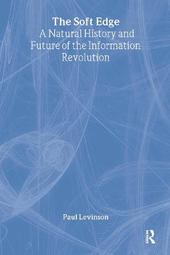
|
The Soft Edge: Natural History and Future of the Information Revolution
Hardback
Main Details
| Title |
The Soft Edge: Natural History and Future of the Information Revolution
|
| Authors and Contributors |
By (author) Paul Levinson
|
| Physical Properties |
| Format:Hardback | | Pages:280 | | Dimensions(mm): Height 234,Width 156 |
|
| Category/Genre | Technology - general issues |
|---|
| ISBN/Barcode |
9780415157858
|
| Classifications | Dewey:601 |
|---|
| Audience | | Undergraduate | | Postgraduate, Research & Scholarly | |
|---|
|
Publishing Details |
| Publisher |
Taylor & Francis Ltd
|
| Imprint |
Routledge
|
| Publication Date |
11 September 1997 |
| Publication Country |
United Kingdom
|
Description
This text presents theories on the evolution of technology, the effects that human choice has on this (r)evolution, and what's in store for us in the future. The author explains how communications media have been responsible for major developments in history and for profound changes in our day-to-day lives. He presents the argument that technology actually becomes more human. We see how information technologies are selected on the basis of how well they meet human needs and consider questions such as: why is email more like speech than print is?; and why didn't the arrival of television destroy the radio?
Reviews"Paul Levinson takes a thoughtful and perceptive dander through the Information Wilderness. Beautifully written, the author has the gift of illuminating the mundane and putting a different spin on developments we no longer think about as being part of a communication revolution. This is a highly readable and thought-provoking book.."-Moira Duncan "Managing Information, Dec 1997 "This history provides a refreshing contrast to texts that are little more than litanies of dates and/or tomes of doomsayers. It provides excellent insights and is suggested reading for those with a keen interest in media."-"Educator ""The Soft Edge is a wonderful book, both as a historical survey of how information technologies have evolved and as a critique of how some media critics have portrayed computers and the Internet."-"Technology and Society "Remarkable in both scholarly sweep and rhetorical lyricism ...what first promises to be the digital "Origin of the Species turns out to be a sequel to "The Odyssey: media's progress is presented as an epic journey toward freedom, unseating censors along the way."-"Wired "Smart, spare, yet deep, and heartily recommended."-"Library Journal Kirkus Review US:The "soft edge" of the title refers to the intangibles surrounding technology's impact on society. The second half of this overview of the development of information techonology gets mired down in elaborating on this definition, to the study's detriment. The "natural history" offered by Levinson, an educator and writer (New School for Social Research) takes the study of information from the dawn of written language to word processing, showing, for instance, how radio, which would presumably be replaced by television, survived by finding its niche with rock 'n' roll - something TV could never offer on the same scale. The implications that Levinson derives from the first part of his study, stressing the ways in which new media have always had a profound impact on human society, are often thought-provoking though sometimes unconvincing. For instance, Levinson ties the success of monotheism to the Israelites, who had an alphabet, as opposed to earlier monotheistic Egyptians, who had hieroglyphics and, thus, lower literacy rates. However, the assertion that the ancient Egyptians ever were monotheistic is only a theory, and is not substantial enough to build yet other theories on, which Levinson repeatedly attempts to do. Further pitfalls await the author as he attempts to attack the World Wide Web and artificial intelligence. His arguments increasingly ignore the larger impact of new information technology on contemporary society altogether, instead addressing such seemingly unrelated topics as copyright law, author compensation, and online education. Levinson's sprawling investigation and proliferating theories lessen the strength of his clever final chapter, which uses instant coffee as an ingenious metaphor for information - you can describe it, he says, and it is an efficient way to transport a product, but if you can't taste it, what good is it? Levinson should have excised the chapters that don't tie in with his central theme. As it stands, The Soft Edge is too soft, and without taste. (Kirkus Reviews)
|